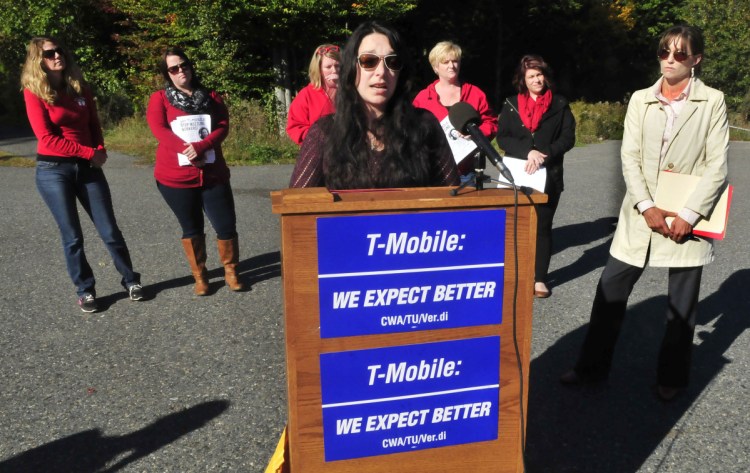A Waterville woman’s allegation of unlawful sexual harassment by a supervisor from a T-Mobile call center in Oakland is on track to go to trial in federal court.
Angela Agganis had filed a lawsuit in U.S. District Court in Maine in October 2015, shortly after holding a news conference outside the Oakland call center, where she had worked for eight years, to complain about working conditions and other practices.
On Monday, U.S. District Judge D. Brock Hornby ruled that the case can continue to trial on the claim that Agganis was subject to a hostile work environment when she was repeatedly sexually harassed by Gary Rochon, who became her coach at T-Mobile in March 2014.
The complaint says “Rochon began to sexually harass her, including, inter alia, repeated and unwanted physical contact with Agganis on at least three occasions, unwanted staring at Agganis in a sexual manner, and offering Agganis a ride home on the first day she began working for him in direct violation of T-Mobile USA’s no fraternization policy.”
One of Agganis’s attorneys, Valerie Z. Wicks, said in a prepared statement sent out Friday that “this decision is important because it reemphasizes that it’s not enough for an employer to simply have a sexual harassment policy, it must have an effective one. A policy is not effective if women are subjected to sex-based slurs, unwanted massages, and leering in the workplace.”
The statement was accompanied by the hashtag #MeToo Sexual Harassment, a reference to the movement in which a number of women have reported being sexually harassed and assaulted in the workplace. Those reports have led to scores of resignations by influential men and to loss of contracts — and to some apologies.
Wicks said Friday afternoon that while the lawsuit predates the #MeToo movement, “This was a case where Ms. Agganis was not the only customer service representative in the Oakland call center who received this type of treatment from this supervisor,” Wicks said on Friday afternoon. “Another woman had come forward previously and others came forward later.”
Agganis had worked for T-Mobile USA, Inc. for eight years prior until quitting in August 2014.
Agganis said she complained about sexual harassment, including inappropriate touching, to Karen Estes, T-Mobile’s human resources manager, and quit immediately after signing a confidentiality agreement prohibiting her from discussing the investigation with anyone. The company’s confidentiality rules were later changed.
Agganis then went public with her case. She also enlisted aid from labor unions, including the Communications Workers of America, and appeared in a video for that labor union, talking about her treatment at T-Mobile.
In his decision following March 7, 2018, oral arguments, Hornby wrote, “The parties hotly contest whether this former employee was sexually harassed at all and if so whether that harassment was objectively offensive and severe or pervasive. Crediting the plaintiff’s version of events where supported by the record as I must at summary judgment . . . I conclude that she has raised triable issues of fact on sexual harassment sufficient to go to a jury.”
The judge also made several other rulings in the case, saying that Agganis cannot recover back pay because she was not compelled to resign.
He also wrote, “I conclude that there is a jury issue on whether the defendant exercised reasonable care to prevent and correct promptly any sexually harassing behavior. A few months before (Agganis) made her complaint about the coach, his conduct had already come to HR’s attention. It was reported that the coach made two suggestive comments to a different customer service representative about her attire that made her uncomfortable. That CSR reported at least one of the comments to a manager, who informed HR.”
Later, Hornby noted, the coach was “counseled” about sending a sexually suggestive cartoon to his team, a violation of the sexual harassment policy.
“A reasonable jury could conclude that the failure ever to address the clothing incident showed that the employer’s implementation of its policy was inadequate,” Hornby said.
According to the complaint, Rochon had been accused of sexual harassment at previous workplaces, and in June 1996, he had surrendered his medical license in Wisconsin after one of his patients said he had sex with her. In a videotaped deposition taken in the offices of Agganis’s attorneys in September 2016, Rochon denies sexually harassing Agganis and says he occasionally gave representatives on his team “a squeeze” or touch on a shoulder to indicate “good job” or touched their hand to redirect a computer mouse.
Wicks, one of Agganis’s attorneys, said that Ms. Agganis has held other jobs since working for T-Mobile, and that she would be unavailable for comment. The case is currently listed for May 7 jury selection in U.S. District Court in Portland.
In the same release, Agganis is quoted as saying, “No working woman should have to endure sexual harassment on the job. And no woman should be denied the right to speak to others about what occurred. I hope this suit will ensure that women working
at T-Mobile are treated with the dignity and respect they deserve and encourage women everywhere to come forward and put an end to intolerable working conditions.”
Rochon was never a defendant in the case. “He left the company some time after Ms. Agganis’s complaint, but he was not fired as result of it,” Wicks said.
Richard Moon, the lead attorney representing T-Mobile, did not return a request for comment sent Friday afternoon via another attorney at the Verrill Dana law firm in Portland.
Betty Adams — 621-5631
Twitter: @betadams
Comments are not available on this story.
Send questions/comments to the editors.



